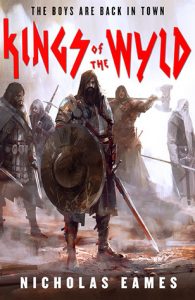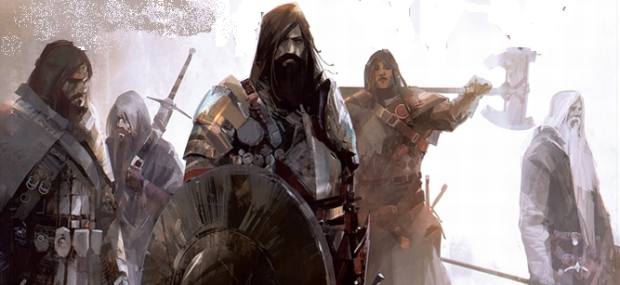Kings of the Wyld by Nicholas Eames
 THE GOOD: Larger-than-life heroes kicking ass and (re)taking their names as the greatest mercenary band to tour the Wyld; more monsters than a Dungeons & Dragons careers’ fair; a high stakes adventure of friends, fiends and f*** ups; more heavy hitting battles than a greatest hits collection; and a hall of fame page-turning performance to make the Bat Outta Hell sit back, buckle up, and hold on for the god-damned ride of its life.
THE GOOD: Larger-than-life heroes kicking ass and (re)taking their names as the greatest mercenary band to tour the Wyld; more monsters than a Dungeons & Dragons careers’ fair; a high stakes adventure of friends, fiends and f*** ups; more heavy hitting battles than a greatest hits collection; and a hall of fame page-turning performance to make the Bat Outta Hell sit back, buckle up, and hold on for the god-damned ride of its life.
THE BAD: It had to end? Seriously, I have one hell of a book hangover after this. Though, and in favour of fairness, if I had to (nit) pick a downside to this cracking debut, it’d be elements of info dumping early on – but don’t let that stop you reading this story, as I’ll explain why it didn’t bother me below in the main review.
THE UGLY TRUTH: Good old-fashioned fantasy heroes, the loud, the proud, and never to be cowed, knocking back whiskies in a sticky-floored, dim-lit dive bar, moshing with every monster known to Dungeons & Dragons; all whilst Terry Pratchett hosts a lock-in of Rock-n-f***ing-Roll tribute bands belting out ear melting hits better than the original act ever did on stage, because they’re doing it for the love of the music, and they love what they do. But if I had to sum Kings of the Wyld in one sentence: They don’t make ‘em like this anymore.
‘Kids these days…they’re obsessed with mercenaries, Clay. They worship them. It’s unhealthy. And most of these mercs aren’t even in real bands! They just hire a bunch of nameless goons to do their fighting while they paint their faces and parade around with shiny swords and fancy armour. There’s even one guy – I shit you not – who rides a manticore into battle!”
“A manticore?” asked Clay, incredulous.
Gabe laughed bitterly. “I know, right? Who the fuck rides a manticore? Those things are dangerous! Well, I don’t need to tell you.”
Saga was once the greatest mercenary band to tour the Heartwyld. Golden Gabe the charismatic frontman, Clay ‘Slowhand’ Cooper the ever-reliable warrior, Moog the magnificent wizard, Matrick Skulldrummer the loveable rogue, and Ganelon the killer. But every star fades with time, and the five members of the band have retired. Since there last circuit, everything has changed. The world’s a new place, and Saga and its members are memories of the old ways, the way things used to be – which provides ample opportunity for plot twists, world building, and of course, madness and mayhem, in this rip-roaring rock’n’roll headbanger from debut author Nicholas Eames.
The action comes thick and fast, but so too does the humour. Not to point out every ‘funny’ as film trailers seem to these days (which would be impossible, as there’s so many in this book) but particular highlights for me include: Steve the doorknocker, Kit the unkillable, a staff that turns swords into something else, a kobold’s cock ring (even if only a mention, but my god, what the fu-?), and the melee involving combatants wielding a hammer, a shield and 3 raging erections. As mad as it sounds, it makes perfect sense. Some might even turn their nose up at that last particular mention, citing immaturity or toilet humour, but it’s not. KotW is mature, its grown up, but it’s still got that energy of a garage band breaking out onto the scene.
“Of course I’ll come,” said Matrick. “You shits are the only real family I’ve got.”
One of the main concepts, the whole fantasy meets classic rock, doesn’t get old. It works, and it works so well that you don’t question it. As a matter of fact, unless it’s pointed out to you at the start, you’re not slapped about the head with it. Suddenly, as you read, you’ll have a eureka moment of ‘oh, I see what Eames has done here!’ Its’ brilliance lies in its simplicity, and the fact that it’s interwoven throughout the story, the characters, the world itself. Without spoiling anything, here’s a few examples:
Characters:
• Clay ‘Slowhand’ Cooper holds the (bass)line of the band (Saga) and the very story itself. A stoic warrior of old, armed with his fabled shield Blackheart and whatever comes to hand, Clay reminded me of Steven Erikson’s Fiddler, but with more heart, and Joe Abercrombie’s Logen Ninefingers, but with more hope. He’s a good man, not afraid to do the bad thing, if it means the difference between right and wrong.
• Gabriel ‘Golden Gabe’ is the charismatic frontman, the cover boy, and the voice (lead singer) of Saga. From the washed-up waste-of-space at the start of the book, to his return to the golden age by the end, his personal quest to save his daughter might be the goal, but his journey of self rediscovery is what gets him there.
• Arcandius Moog the mystical, maniacal, and above all moving keyboard player. A pyjama wearing wizard who supports his own life’s pursuit to cure ‘the rot’ (which claimed the life of his dearly loved husband) by selling Magic Moog’s Phallic Phyllactery. Read that again. Yes, you read it correctly. Moog sells a male performance enhancer that’ll turn you from ‘zero to hero’. I kid you not, you can’t make this shit up…and Eames has, which is testament to his creativity and innovation.
• Matrick Skulldrummer, the party’s ‘lively’ rogue with a penchant for drink, takes the role of drummer (it’s in the name) armed with his twin knives Roxy and Grace. He and Moog provide much of Saga’s comic relief, as well as one of its most heartfelt moments. Like all of them, Matty was at his peak in his yester year, when he saved the Princess of Agria and swiftly bedded his way to kingship. Now, he’s all but captive in his own kingdom, and only Saga can give him a way out.
• Ganelon the axeman. Big, bold and badass, he shreds his foes both as part of the band, or ‘solo’. Lead guitarist if you hadn’t guessed it. We’re not properly introduced to him until a little later on in the story, but when he arrives on stage he’s greeted by raucous applause, not in the least because he all but singlehandedly takes on one of the most fearsome monsters that the Wyld has to throw at Saga.
The World:
• Mercenary groups/parties are known as ‘bands’. Almost everyone with a sword, shield, spear, or a stone/stick/scrap of ambition wants to be in a ‘band’.
• The ‘bands’ score ‘gigs’ via ‘bookers’ who manage their careers.
• These ‘gigs’ for the most part take them on ‘tours’ of the Heartwyld.
• The ‘bands’ are welcomed by parades of screaming fans when they return from their ‘tours’.
Speaking of world building, I’d like to take a moment to discuss my one and only problem with KotW. And it’s not the world itself – hell no, Eames has absolutely smashed it with this; I for one normally turn-off to fantasy realms populated with goblins, orcs, slimes, owlbears, giants, wyverns, and every other usual host you’d expect to see in a DnD manual or one of the many B-grade straight-to-DVD-bargain-bucket movies. But not so with KotW, as Eames breathes new life into the old foes and fiends, either through reimagining or realism. That being said, I’ve strayed from the point – my one problem with KotW and its worldbuilding, is, at times, the execution of introducing the reader to the world. I’m talking info-dumps.
The info dumps are few and far between (and by a third of the way in I didn’t spot any more), and they’re actually pretty good as far as info dumps go, but once I read one, I can’t help but notice others. In a way, that’s a symptom of me as a reader and aspiring writer – it’s been hammered into me so many times that ‘info dumping is bad;’ ‘don’t info dump;’ or my personal favourite, shout out to 2 Unlimited: ‘no no; no no no no; no no there’s no limit (except on info dumps)’. In a way, info dumping stems from, or feeds into, or goes hand in hand, with the old ‘show vs tell’ debate/debacle.
But why don’t I take umbrage with these info dumps? Besides the fact that the info dumps are used to introduce us to a vast and richly populated world (including religion, history, politics to a lesser extent, and biology too – monsters!), I’m also dismissing my nit picking (and this is what I’m doing – in the grand scheme, this book is just that good) due to context. Context, yes. Because I know, from having spoken to the author, that KotW evolved over the stage of its life. Its ‘growth’ is fascinating, especially for an industry outsider looking in. It went a little something like this:
• First draft 114,000 words.
• Beta reading feedback pushed this up to 117,000 words.
• Agent amendments cut it back to 102,000 words.
• Publishing house picks-out and chops backstory excerpt chapters, opting to have them sprinkled throughout, cutting it down to almost 90,000 words.
• Additional additions/editorial edits pushed this all the way back up to 150,000 words.
So why the uplift right at the end? From what I understand, when Eames secured his book deal with the publisher, he ended up adding whopping 50k words (almost a third of the original’s length). Why though? The pacing of the first draft was pretty breakneck, but also barebones – and by adding to the wordcount Eames had the opportunity to: a) flesh out his scenes a little more, and b) world build, world build, world build. Needless to say, Eames wasted neither opportunity, and the scenes are all the more gritty, emotional, and real because of it, and the world…well, it’s a world¸ a living breathing world, and that’s praise enough itself.
And in my opinion, every single word is bloody brilliant.
Despite my misgivings of the info dumping, looking back, I couldn’t give a damn about it anymore. Every word brought this world to life; every word a charge in a synapse, a beat of a heart. And without them, this book would be just that – a book. Instead, it’s very, very real – or at least I wished it was!
Kings of the Wyld is one of those books that could easily transcend the written word, and easily be a summer blockbuster, a TV series (Netflix, I’m looking at you!), or a video game (Dragon Age style or MMORPG springs to mind). I mean, it’s already got its own soundtrack!
It kills me that I can’t give this book a 10 out of 10. Why? Because Eames cranked it all the way to 11. So f*** it, you know what? 11 out of 10. As the saying goes:
They don’t make ‘em like they used to.
But Eames did. And he made it better.

Art by Richard Anderson
This review originally appeared on Michael Everest’s blog on February 28, 2017.

[…] That time he wrote his very first post on the Hive, and forgot how basic maths works – a review of Kings of the Wyld […]